December 23, 2010
今年の漢字 Kotoshi no Kanji = Kanji of the year
みなさん、こんにちは!
The Kanji of the year (Kotoshi no Kanji) is a kanji chosen by the Japanese Kanji Proficiency Society (Zaidan hōjin Nihon Kanji Nōryoku kentei kyōkai) through a national ballot in Japan. It began in 1995. The character with the most votes is selected to represent the events of that year, and is announced in a ceremony on December 12 (Kanji Day) at Kiyomizu Temple.
Wikipedia
今年の漢字(ことしのかんじ)は、財団法人日本漢字能力検定協会が、毎年12月12日(ずれる場合もあり)の「漢字の日」に発表している、その年の日本や世界の世相を表した漢字一字のことである。
Wikipedia
財団法人(ざいだんほうじん): foundation
日本(にほん)漢字能力(かんじのうりょく)検定協会(けんていきょうかい):
the Japanese Kanji Proficiency Society
毎年(まいとし): every year
ずれる: give or take
場合(ばあい): case
発表(はっぴょう)する: announce
世界(せかい): world
世相(せそう): social situation
表(あらわ)す: represent
今年の漢字は「暑」
今夏の平均気温は統計史上最高を記録。
平均(へいきん): average
気温(きおん): air temperature
統計(とうけい): statistics
史上(しじょう)最高(さいこう)を記録(きろく): an all-time record猛暑で熱中症にかかる人が続出したことや、チリ鉱山の落盤事故で作業員33人が暑い中を生き延びたことなどが理由に挙がった。
猛暑(もうしょ): extremely [intensely] hot
熱中症(ねっちゅうしょう): heat stroke
続出(ぞくしゅつ): appear one after another
鉱山(こうざん): mine
落盤(らくばん)事故(じこ): a collapse accident
作業員(さぎょういん): workers
生(い)き延(の)びた: survive
など: and others
理由(りゆう)に挙(あ)がる: name reasons
共同ニュース
今年は本当に暑かったです!(>_<)
December 21, 2010
冬至(とうじ) Toji = Winter solstice
みなさん、こんにちは!
Tomorrow, 22nd (Wed) is "Toji" = Winter solstice.
Toji is the day of the shortest day-time and longest night-time.
In Japan, it is said that if you eat pumpkin and take a Yuzu bath on the day, you won’t catch cold in the next year.
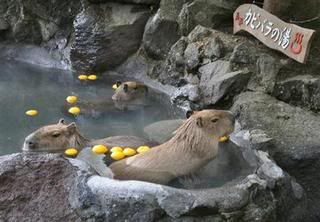
カピバラ Capybara is taking a Yuzu bath. (this zoo is in Izu)
msn news
明日22日(水)は冬至(とうじ)です。
冬至は1年の間で昼が最も短くそして夜が最も長くなる日です。
1年(ねん)の間(あいだ): throughout a year
昼(ひる): day time
最(もっと)も: the most/least
短(みじか)く: adverbial usage/form of 短い
そして: and then
夜(よる): night time
長(なが)く: adverbial usage/form of 長い
夜が最も長くなる日: the day that is the longest night
そして冬至の日にゆず湯に入ってかぼちゃを食べると1年間かぜをひかないと言われています。
ゆず: Yuzu, a kind of citrus fruit that has strong aroma
and very bitter
ゆず湯(ゆ): put some Yuzu into bathtub that add good aroma
and vitamins
かぼちゃ: pumpkin
食(た)べると~: if you eat it then ~
かぜをひかない: do not catch cold
~といわれています: it is said that ~
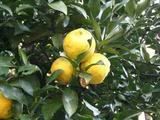
ゆず: Yuzu
December 19, 2010
東京クリスマス・イルミネーション2010 Tokyo Christmas Illuminations 2010
みなさん、こんにちは!
もうすぐクリスマスですね!
もうすぐ: soon
今いろいろなところでクリスマス・イルミネーションが見られます。
今(いま): now
いろいろなところ: various places
見(み)られます: can see
るるぶ.com イルミネーション・スポット 2010 東京
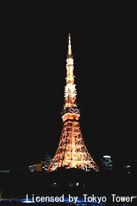
東京タワー Tokyo Tower
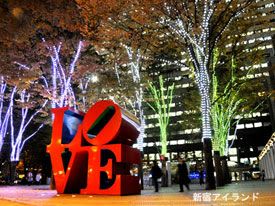
新宿アイランド Shinjuku I・Land
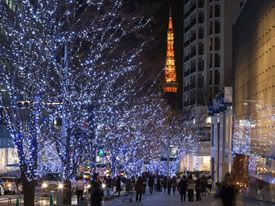
六本木ヒルズ Roppongi Hills
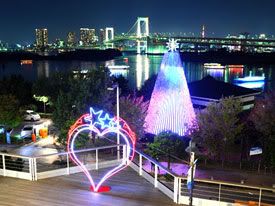
お台場 Odaiba
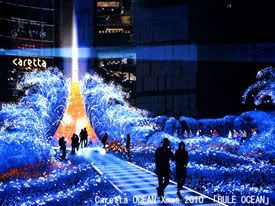
カレッタ汐留 Caretta Shiodome
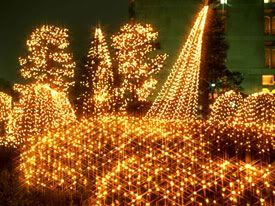
帝国ホテル Imperial Hotel Tokyo
Difference between 「見られる」 vs 「見える」
If you want to see the thing, use 「見られる」.
ex. ちょっと遠いけどあの動物園に行けばペンギンパレードが見られるよ。
(The zoo is a little bit far from here but you can see “Penguin Parade”
there.) -> You want to see the parade.
ちょっと: a little bit
遠(とお)い: far
動物園(どうぶつえん): zoo
行(い)けば: if you go
ex. このホテルは駅から近くていいけど、窓から汚いゴミ置き場が見えるよ。
(I like this hotel as it is close to the station but you see a dirty garbage
pickup site from the window.)
駅(えき): station
近(ちか)くていい: close and good, adjective connective
窓(まど): window
汚(きたな)い: dirty
ゴミ置(お)き場(ば): garbage pickup site, garbage gathering place
December 13, 2010
ノルウェーの森 Norwegian Wood
みなさん、こんにちは!
村上春樹原作の「ノルウェーの森」の映画が11日から公開されました。
Norwegian Wood released on 11th (Sat).
村上(むらかみ)春樹(はるき): Haruki Murakami
原作(げんさく): original piece
映画(えいが): movie
公開(こうかい)された: released

The Tokyo Report
Norwegian Wood Trailer
2009年9月22日のBlog
December 4, 2010
がんばってくださいね!
みなさん、こんにちは!
忙しくてBlogが書けなくてごめんなさい。
明日JLPTを受けるみなさん、がんばってくださいね!
Sorry for not writing for a while I have been busy.
Gambatte for all who take JLPT tomorrow!
Subscribe to:
Posts (Atom)



